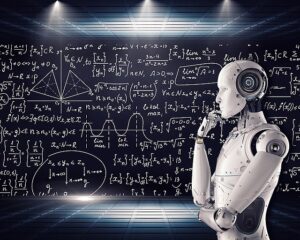 The headlong rush to enhance, or even replace, human capabilities with artificial intelligence (AI) is having a rapidly growing impact on the medical profession.
The headlong rush to enhance, or even replace, human capabilities with artificial intelligence (AI) is having a rapidly growing impact on the medical profession.
Developments in creating self-learning computers to diagnose and treat patients are showing stunning progress. There are even suggestions that they could make some medical professionals obsolete.
At the same time, they have the potential to open a nightmarish situation where any sense of Personhood is nonexistent in caring for the most vulnerable among us.
AI – Computers, Outperform Doctors
How efficient the process has become was demonstrated in a test designed to evaluate how well computers and dermatologists diagnosed dangerous skin conditions. What was revealed was startling. Computers outperformed expert dermatologists in almost every case!
Results showed that computers were:
- More sensitive in analyzing the evidence.
- Less likely to miss a melanoma.
- More specifically and less likely to call something a melanoma when it wasn’t.
Computers are also faster at diagnosing patients. A full-time dermatologist will see about 200,000 patients during their career. An algorithm-powered computer can handle 130,000 cases in about three months.
Carrying the concept even further, one researcher envisions a world in which we’re constantly under diagnostic surveillance. Our cell phones would analyze shifting speech patterns to diagnose Alzheimer’s. A steering wheel would pick up incipient Parkinson’s disease through small hesitations and tremors.
There’s even a suggestion that a bathtub could perform sequential scans as we bathe using harmless ultrasound or magnetic resonance to determine whether there’s a new mass in an ovary that requires investigation, for example.
“Deep Learning” Is Mysterious
Of concern, however, is that researchers admit they don’t understand exactly how computers are able to do what they do, warning that their “inner workings are mysterious.” That’s because the self-learning process, “deep learning,” happens away from human scrutiny.
“Deep learning” is the end result of a broader concept called machine learning that uses “neural networks.”
- Machine learning is the branch of computer science that deals with building algorithms that are guided by data. The algorithms use training sets of real-world data to develop models that are more accurate and more sophisticated than humans can devise.
- Neural networks are a subset of algorithms built around a model of artificial neurons spread across three or more layers. The idea is to simulate how a human brain works.
- “Deep learning” exists when a neural network has a large number of layers allowing the computer to learn without human supervision.
The fact that the learning process happens in secret is called the “black box problem.”
Noting that Google is training computers to predict when a patient will die, Georgia Right to Life (GRTL) President Ricardo Davis said, “It’s not hard to imagine a world where computers teach themselves to recommend that someone is not worth the effort or expense to keep them alive.”
Davis added, “Computers deal with facts, not compassion, or understanding about unique circumstances. If not controlled, the sanctity of human life will not be a factor in making medical decisions, including end of life issues.”
Another concern is privacy. Many researchers are promoting the concept of allowing computers to have unfettered access to a patient’s “raw medical information.” Both I.B.M.’s Watson Health, headquartered in Cambridge, MA, and DeepMind, in London, hope to create such comprehensive systems.
All of this is another example of technology that can be used for both good and evil. GRTL will join other organizations in monitoring developments in these activities and be prepared to speak out when necessary to ensure that computerizing healthcare does not destroy people’s God-given right of Personhood.
Sources: newyorker.com; dailynebraskan.com; upwork.com; bloombergquint.com.
By Wayne DuBois
Georgia Right to Life
Media Relations Advisor
